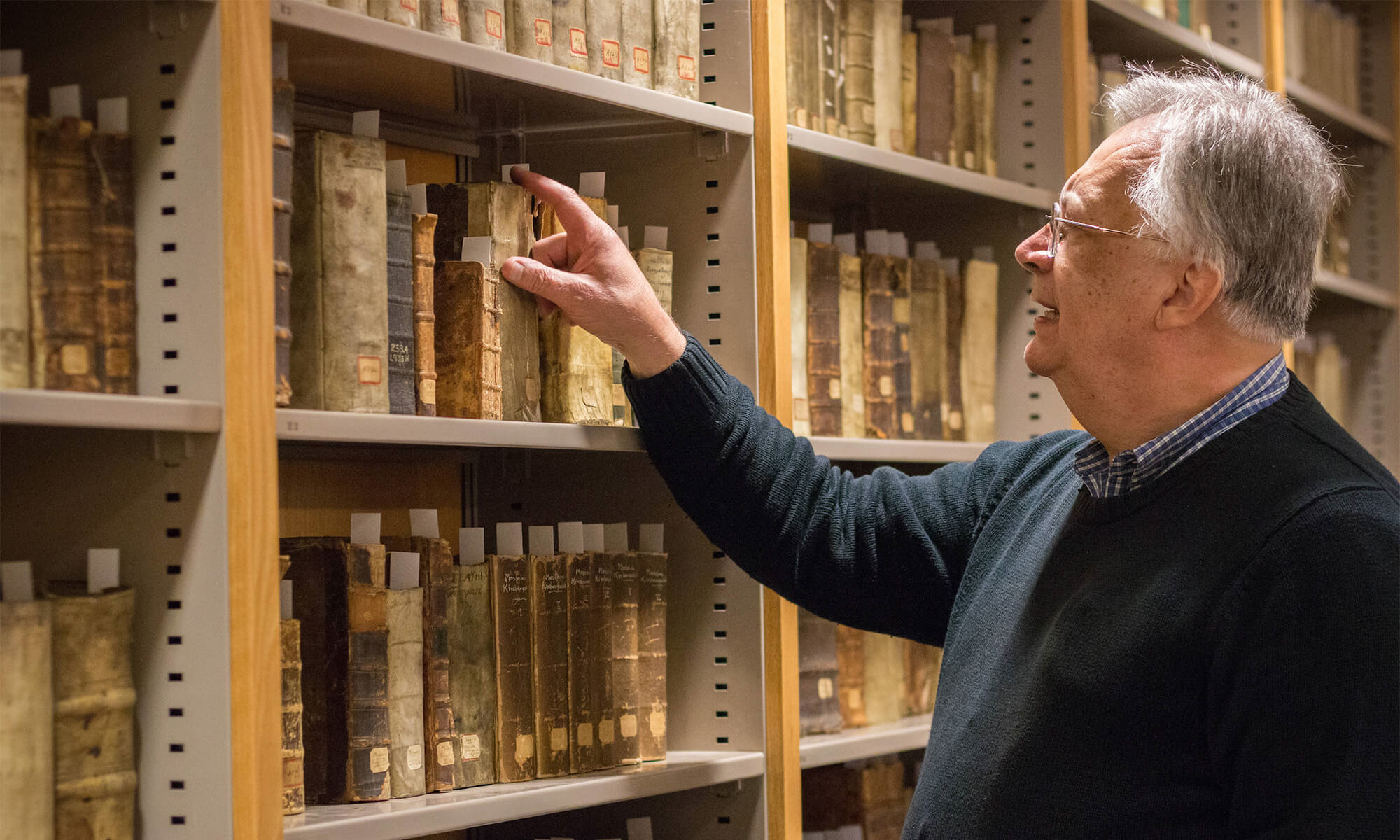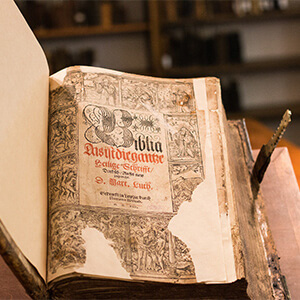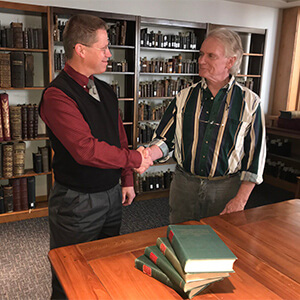
David Krenz is a bibliophile.
 The Concordia University Wisconsin English professor says his love of literature started when he was young and has continued ever since. Throughout his life, he’s made a point of visiting some of the most famous libraries in the world, including the Bibliothèque in France and the British Library in London, as well as others throughout the United States. When Krenz retires at the end of this month after 29 years on Concordia’s faculty, he’ll pack up the more than 1,200 books in his office and add them to the thousands of others he has stored at his home.
The Concordia University Wisconsin English professor says his love of literature started when he was young and has continued ever since. Throughout his life, he’s made a point of visiting some of the most famous libraries in the world, including the Bibliothèque in France and the British Library in London, as well as others throughout the United States. When Krenz retires at the end of this month after 29 years on Concordia’s faculty, he’ll pack up the more than 1,200 books in his office and add them to the thousands of others he has stored at his home.
“They’re like my friends,” Krenz says of his collection. “Books are some of the great treasures of mankind.”
It’s not surprising then that in recent years Krenz has taken a special interest in The Moeller Rare Books Room on Concordia’s campus, which houses hundreds of texts spanning from the 1400s through the 1800s.
The room, which has been in existence since 2004, was made possible through the Arnold H. and Verna L. Moeller Fund. Over the years, Concordia has been the recipient of numerous rare books—donations from community members and others who are connected to the university.
This year the books have become more accessible to the general public thanks to countless volunteer hours put in by Krenz, in partnership with CUW’s Rincker Memorial Library staff. Beginning a few years ago, Krenz utilized his knowledge of German, Latin, Hebrew, and Greek, and began to inventory and categorize the rarer materials so that those interested in studying the historic tomes could more easily navigate the selections.
“We have this gem on Concordia’s campus, but it needed organization,” Krenz says of The Moeller Rare Books Room. “The collection is one we can really be proud of. Next to St. Louis’, it’s likely the second-largest collection in The Lutheran Church—Missouri Synod. The two collections are really complimentary to one another.”
Included among The Moeller Rare Books Room’s prized texts are several early printings of influential works by notable theologians, including Martin Luther, Philipp Melanchthon, Johannes Brenz, Martin Chemnitz, and Johann Gerhard.

Last November, Mark Albrecht, great-grandson of Concordia’s second president Rev. Max Albrecht, gifted Concordia a treasured text from his family’s collection: volumes 1-3 and the index of “Christian Dogmatics.” The texts are filled with annotations and markings from Mark Albrecht’s grandfather, W.W.F. Albrecht, the man who is responsible for translating the widely revered text into English.
W.W.F Albrecht was a professor at Concordia Theological Seminary when he translated the writings of Francis Pieper from their original German to English. In so doing, he made the texts accessible to generations of seminarians.
“There have been supplemental texts along the way, but ‘Christian Dogmatics’ remains the standard text as they train our LCMS pastors at the St. Louis and Fort Wayne seminaries,” says Dr. Roland Ehlke, a friend of Mark Albrecht. “What makes the copies Concordia possesses so interesting is that we have the translator’s copies with his authentic annotations. As a reader, you really gain insight into the English version of the text and how Albrecht arrived at some of the decisions he made.”
Over the past several years, other notable donations have been made to The Moeller Rare Books Room as well:
- Dr. Gottfied G. Krodel, a former professor at Valparaiso University, donated his personal library of over 250 cases. The bulk of the books represent a collection squarely centered on the Lutheran Reformation, including many unique, significant, or particularly rare works.
- Donald Busarow, who was a longtime choir director at Wittenberg College, donated more than 400 antiquated hymnals, prayer books, psalters, and miniature Bibles. Many of them date back to as early as the 17th century, and many are unique, well-documented and well-maintained.
- Dwayne Bogenschneider, who graduated from Concordia High School in 1963 and Concordia Junior College in 1965, donated a 1542 limited printing of Luther’s German translation of the Bible, printed by a Roman Catholic printer, Nicolas Wolrab, in Germany. The printing of this text began in 1541, and ended in 1542 because Luther himself requested that the printing be stopped.
- Former Mequon-based Schaum Publications donated a significant collection of music books, including a fair number of hymnals, when the store was purchased in 2016 by Hal Leonard Corp. Many of the hymnals are early printings, circa the latter half of the 1800s into the 1900s.
It’s likely many of the Moeller Rare Books Room’s original contents first belonged to pastors who immigrated to America, says Director of Library Services Christian Himsel.
“We’re very blessed with the collection we have at Concordia,” says Himsel. “We’ve reached a point today where you can see books so cheap that you can just hand them out, but that wasn’t always the case. At one point in time, books were incredibly valuable. Now we hold in the Moeller Rare Books Room some of the treasures that people years ago valued enough that they couldn’t leave them behind during their journey to America. Indeed, works that represented not only their professional libraries, so to speak, but more importantly, that expounded the truth of God’s Word in all its purity. And, honestly, what could have been more valuable than that?”
— This story is written by Kali Thiel, director of university communications for Concordia University Wisconsin and Ann Arbor. She may be reached at kali.thiel@cuw.edu or 262-243-2149.
If this story has inspired you, why not explore how you can help further Concordia's mission through giving.